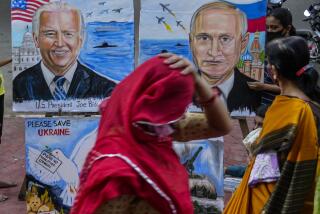Handshake Puts It All on the Line
- Share via
For the second time, Pakistan President Pervez Musharraf and India Prime Minister Atal Behari Vajpayee have shaken hands at a South Asian Assn. for Regional Cooperation summit.
The bonhomie was one-sided on the first occasion. With television cameras whirring, Musharraf extended his hand at the 2002 meeting in Katmandu; a surprised Vajpayee was taken aback and not amused at having been sandbagged.
Back then, India-Pakistan relations were at a low point. Indian leaders saw Musharraf, who had seized power in 1999 after toppling the government of Prime Minister Nawaz Sharif, as another in a line of Pakistani strongmen. Moreover, he had masterminded the Pakistani military’s move into the Kargil sector of Kashmir, which produced fierce fighting between India and Pakistan.
And, in 2001, there was a bloody attack on India’s Parliament by radical Kashmiri Islamists. India blamed the government of Pakistan for the Parliament attack and massed 500,000 troops along the joint border. Pakistan vowed to take all measures to protect itself -- a phrase that no one had difficulty deciphering, given that the two South Asian states had gone nuclear in 1998.
Against this backdrop, it was not surprising that last year’s handshake led nowhere. This time, the context is different.
Last month, Musharraf survived two attempts on his life that are widely believed to have been staged by militant Islamists. The militants are outraged by his decision to help the U.S. in its war against the Taliban and Al Qaeda, and they view his apparent willingness to reconsider Pakistan’s long-standing demand for a plebiscite in Kashmir as veritable apostasy.
The attempts on his life have convinced Musharraf that radical Pakistani Islamic groups -- which he used to call “freedom fighters” -- have turned their guns on him and are a bigger threat than India.
For its part, New Delhi believes that it is dealing with Pakistan from strength. India’s economy is booming, and the U.S. refers to India as a strategic partner.
By contrast, Pakistan’s economy is in trouble; reports about Pakistani aid to the nuclear programs of Iran, North Korea and Libya have dominated the newspapers; and a nuclear-armed Pakistan could collapse.
India’s leaders believe that Musharraf’s recent brushes with death may have persuaded him to stop what India has long called “cross-border” terrorism.
These are the reasons the latest handshake -- which was preceded by back-channel negotiations and the resumption of transportation links between India and Pakistan -- took place and why Vajpayee was ready and smiling this time.
But although many now expect dramatic changes in South Asia, there are formidable obstacles to peace.
Musharraf’s room for maneuvering is limited because Pakistan’s Islamists are a powerful political force. They are well represented in the national parliament, govern the North-West Frontier Province and are partners in running Baluchistan, regions that are hotbeds of anti-American sentiment.
Musharraf risks everything if it looks like he is caving to India at American urging. Without him, the budding detente with India would be uprooted; its roots in Pakistan’s key institutions (the army and the intelligence services) are shallow. Despite the current conviviality, the devil buried in the details will soon emerge. India will have to offer something substantial on Kashmir if Musharraf is to go further. Vajpayee must sell any such concessions to a skeptical public and, more important, to the hawks within his Cabinet.
More handshakes, trade and cultural exchanges won’t do. What’s needed is a formula that reconciles India’s claim that Kashmir is an Indian state with Pakistan’s insistence that Kashmir is an unresolved issue dating back to the creation of India and Pakistan out of the detritus of the British Raj in 1947. And at that point, both sides will find themselves held hostage to their history and national identities.
Kashmir is part of Pakistan’s reason for being, inasmuch as the logic for Pakistan was that only a separate state would save South Asia’s Muslims from Hindu domination. For Pakistan, the claim to India’s only Muslim majority state is tied to its national identity and legitimacy. Likewise, for India, which has about as many Muslims as Pakistan, Kashmir is bound up with its secularist image and rationale.
Paradoxically, the greatest danger does not lie in these barriers but in the unintended consequences that could flow from initial successes.
A peace process between India and Pakistan that encounters the rocks of reality but progresses far enough to trigger the overthrow or assassination of Musharraf could bring upheaval in Pakistan. And that would make the impasse over Kashmir seem like child’s play.
More to Read
Sign up for Essential California
The most important California stories and recommendations in your inbox every morning.
You may occasionally receive promotional content from the Los Angeles Times.













